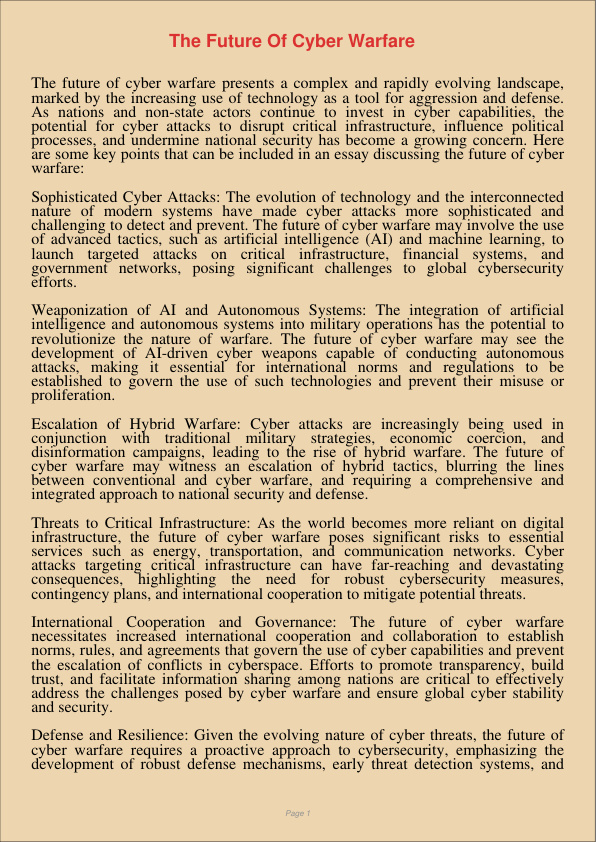The Future Of Cyber Warfare
Dec 31, 2023
cyber warfare
future
Environmental Studies
Engineering and Construction
The future of cyber warfare presents a complex and rapidly evolving landscape, marked by the increasing use of technology as a tool for aggression and defense. As nations and non-state actors continue to invest in cyber capabilities, the potential for cyber attacks to disrupt critical infrastructure, influence political processes, and undermine national security has become a growing concern. Here are some key points that can be included in an essay discussing the future of cyber warfare:
Sophisticated Cyber Attacks: The evolution of technology and the interconnected nature of modern systems have made cyber attacks more sophisticated and challenging to detect and prevent. The future of cyber warfare may involve the use of advanced tactics, such as artificial intelligence (AI) and machine learning, to launch targeted attacks on critical infrastructure, financial systems, and government networks, posing significant challenges to global cybersecurity efforts.
Weaponization of AI and Autonomous Systems: The integration of artificial intelligence and autonomous systems into military operations has the potential to revolutionize the nature of warfare. The future of cyber warfare may see the development of AI-driven cyber weapons capable of conducting autonomous attacks, making it essential for international norms and regulations to be established to govern the use of such technologies and prevent their misuse or proliferation.
Escalation of Hybrid Warfare: Cyber attacks are increasingly being used in conjunction with traditional military strategies, economic coercion, and disinformation campaigns, leading to the rise of hybrid warfare. The future of cyber warfare may witness an escalation of hybrid tactics, blurring the lines between conventional and cyber warfare, and requiring a comprehensive and integrated approach to national security and defense.
Threats to Critical Infrastructure: As the world becomes more reliant on digital infrastructure, the future of cyber warfare poses significant risks to essential services such as energy, transportation, and communication networks. Cyber attacks targeting critical infrastructure can have far-reaching and devastating consequences, highlighting the need for robust cybersecurity measures, contingency plans, and international cooperation to mitigate potential threats.
International Cooperation and Governance: The future of cyber warfare necessitates increased international cooperation and collaboration to establish norms, rules, and agreements that govern the use of cyber capabilities and prevent the escalation of conflicts in cyberspace. Efforts to promote transparency, build trust, and facilitate information sharing among nations are critical to effectively address the challenges posed by cyber warfare and ensure global cyber stability and security.
Defense and Resilience: Given the evolving nature of cyber threats, the future of cyber warfare requires a proactive approach to cybersecurity, emphasizing the development of robust defense mechanisms, early threat detection systems, and resilient infrastructure. Investments in cybersecurity education, research, and the development of advanced cybersecurity technologies will be essential in building a secure and resilient digital ecosystem.
In conclusion, the future of cyber warfare presents complex challenges that require a comprehensive and collaborative approach to cybersecurity, international governance, and the responsible use of emerging technologies. Addressing these challenges will necessitate proactive measures to enhance cybersecurity capabilities, strengthen international cooperation, and foster a shared commitment to upholding the principles of cybersecurity and digital resilience in the face of evolving cyber threats.
